

Banking privacy trumps copyright claim, Dutch court rules. Privacy laws protecting bank account holders are more important than providing information to aid in copyright enforcement, according to a Dutch court ruling this week. The Dutch ING Bank doesn't have to reveal who has access to a bank account, the number for which is posted on the website FTD World, the Amsterdam district court ruled. FTD World, at ftdworld.net, is a Usenet-indexing website that lists links to binary files posted on Usenet. It also provides files in the NZB format listing that allows users to download the posted files more easily.
By doing this, the site provides access to copyrighted entertainment files including books, movies, music, games, and software without the permission of the copyright holders, according to Dutch anti-piracy foundation Brein. La protection du droit d’auteur, fossoyeur de la liberté d’expression ? « Droits d’auteur. Reporter sans frontières publie chaque année un baromètre des libertés sur Internet, pays par pays.
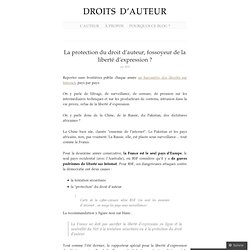
On y parle de filtrage, de surveillance, de censure, de pression sur les intermédiaires techniques et sur les producteurs de contenu, intrusion dans la vie privée, refus de la liberté d’expression. On y parle donc de la Chine, de la Russie, du Pakistan, des dictatures africaines ? La Chine bien sûr, classée "ennemie de l’internet". Le Pakistan et les pays africains, non, pas vraiment. La Russie, elle, est placée sous surveillance… tout comme la France. Pour la deuxième année consécutive, la France est le seul pays d’Europe, le seul pays occidental (avec l’Australie), où RSF considère qu’il y a de graves problèmes de liberté sur Internet. La tentation sécuritairela "protection" du droit d’auteur Carte de la cyber-censure selon RSF (en noir les ennemis d'internet ; en rouge les pays sous surveillance) La recommandation y figure noir sur blanc :
Freedom of Speech ties noose around Scientology's neck. Recently, the notorious Scientology company cobbled together yet another attempt to defend their attacks against freedom of speech on the Internet.
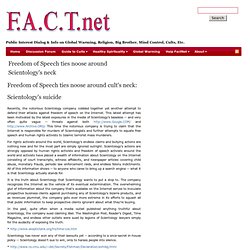
This latest attempt has been motivated by the latest exposures in the media of Scientology's baseless -- and very often quite vague -- threats against both and This time the notorious company is trying to claim that the Internet is responsible for murders of Scientologists and further attempts to equate free speech and human rights activists to Islamic terrorist mass murderers.
For rights activists around the world, Scientology's endless claims and bullying actions are nothing new and for the most part are simply ignored outright. It is the truth about Scientology that Scientology wants to put a stop to.
The Netherlands: Scientology v. XS4ALL and others. Having been notified that copyrighted material has been published through their servers, the defendant ISP was liable for that material.
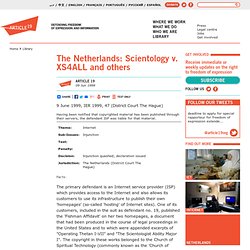
Facts: The primary defendant is an Internet service provider (ISP) which provides access to the Internet and also allows its customers to use its infrastructure to publish their own 'homepages' (so-called 'hosting' of Internet sites). One of its customers, included in the suit as defendant no. 19, published the 'Fishman Affidavit' on her two homepages, a document that had been produced in the course of legal proceedings in the United States and to which were appended excerpts of "Operating Thetan I-VII" and "The Scientologist Ability Major I".
The copyright in these works belonged to the Church of Spiritual Technology (commonly known as the 'Church of Scientology'). Having been asked to do so by the plaintiff, she removed the affidavit in February 1996, and replaced it with pages in which she quoted from the documents. Held: CopyR/privacy in conflict with FoE/press. German Constitutional Court confirms BGH's 'AnyDVD' copyright decision. In October 2010, the Bundesgerichtshof ("BGH"), Germany's highest court in civil law matters, decided in the 'AnyDVD' case (case reference I ZR 191/08) a lawsuit brought by several music companies against Heise Verlag, an online publisher specializing in IT and computer news (see the IPKat's earlier report here).
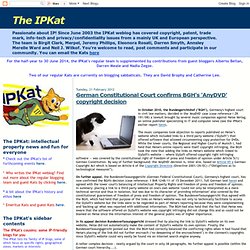
The music companies took objection to reports published on Heise’s website which included links to a third party website ("SlySoft") that offered software that allowed circumventing copy protection for DVDs. Sopa / pipa - Page 2 - Dynamic Drive Forums. Copyright and Privacy in the Hong Kong and Australian Legal Regime. Online piracy laws must preserve Web freedom. Egyptian anti-government bloggers work on their laptops from Tahrir Square during last year's uprising to oust Hosni Mubarak Ivan Sigal and Rebecca MacKinnon say Congress is mulling bills to stop online piracyLaws would make social media platforms proactively police for copyright violations, they sayThey say drafters mean to protect copyright, but effect will be to stifle dissentWriters: Laws should reflect Congress' stated aim to protect rights of Internet users globally Editor's note: Ivan Sigal is executive director and Rebecca MacKinnon is co-founder of Global Voices Online, an international citizen media network.
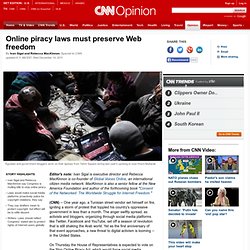
MacKinnon is also a senior fellow at the New America Foundation and author of the forthcoming book "Consent of the Networked: The Worldwide Struggle for Internet Freedom. " (CNN) -- One year ago, a Tunisian street vendor set himself on fire, igniting a storm of protest that toppled his country's oppressive government in less than a month. Ivan Sigal. Using copyright infringement to remedy a privacy violation. I've received many queries about the website IsAnyoneUp.com.
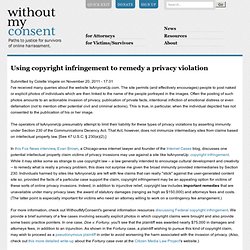
The site permits (and effectively encourages) people to post naked or explicit photos of individuals which are then linked to the name of the people portrayed in the images. Often the posting of such photos amounts to an actionable invasion of privacy, publication of private facts, intentional infliction of emotional distress or even defamation (not to mention other potential civil and criminal actions). This is true, in particular, when the individual depicted has not consented to the publication of his or her image. The operators of IsAnyoneUp presumably attempt to limit their liability for these types of privacy violations by asserting immunity under Section 230 of the Communications Decency Act.